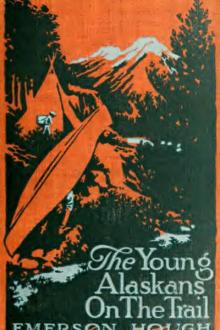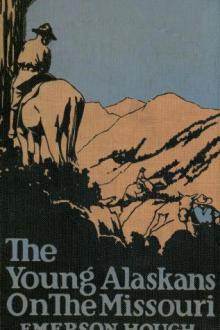Young Alaskans in the Far North by Emerson Hough (ereader android .txt) 📕

- Author: Emerson Hough
- Performer: -
Book online «Young Alaskans in the Far North by Emerson Hough (ereader android .txt) 📕». Author Emerson Hough
“There is an Indian village below here, and a government school for Indian boys, besides the Anglican mission-house and church. It certainly does seem more civilized. This is our own country.
“And this is the Yukon that runs between the banks here—our own old Yukon! I love it better than the Mackenzie. For a while at least we will be under our flag, and not any other. All tired. Next we’d better go to bed. However, made camp near a road-house, almost a mile from the Indian village. Some whites live here who seem tough and noisy. Some liquor here with them, for they seem to be shouting and singing.
“Although we have been on American soil or American water since we left Rampart House on the Porcupine, this seems to us like the first time we have really been in our own country. Good night! Wish we were all home at Valdez with our people.”
XIV AT FORT YUKONIt was a ragged and dirty party of travelers, to be sure, who lay in the litter of the dooryard of the road-house, wrapped in their blankets, and sleeping late in spite of the warm morning sun which shone into their faces. They were exhausted by the long, trying, and hard work of their dangerous journey, and, once they felt safe, had fallen into the half-stupor which follows such fatigue. Therefore they did not at first know of the presence of the dignified and well-dressed man who stood hanging over the gate of the road-house, looking at the sleepers as they lay in the yard, rolled up in their blankets. Uncle Dick, always alert, was first awake, and sat up in his blankets.
“Good morning, sir,” said he to the stranger.
“Good morning, sir,” replied the other, in turn. “Excuse me, but I’ve been asked to look for the party of Mr. Richard McIntyre, himself and three young boys, who are reported to be lost somewhere between here and the mouth of the Mackenzie River. The relatives have sent in word by cable, and naturally it has come into my hands.”
“I beg your pardon, sir,” said Uncle Dick, sitting still, half-clad in his blankets, “but, although you may not suppose it, I am Mr. McIntyre, and these are the young men referred to, no doubt. You have word from outside?”
“From Mrs. Vernon Wilcox, of Valdez, and from Mrs. Henry D. Hardy, of the same city; I have the message here. It came down from Circle City on the last boat.”
“And you, sir? I beg your pardon—”
“I am the archdeacon of the Anglican Church in this district,” replied the other, “and my name is Hudson. I have come this morning to ask you to our house to live during your stay here. There will be no boat out for some days as yet.” Still he looked half-doubtfully at the man whom he addressed, as though possibly he might be some impostor, so strange did he appear, unshaven, with long hair, and in garments which barely clung together.
Uncle Dick laughed at this, and explained that he did not blame any one for suspecting himself and his party of anything in the world. Then he called to his young companions, and the archdeacon himself smiled when he saw the four standing, the fresher for the pails of water which they threw over one another, in the front yard.
“I am a traveler myself,” said he, “and have mushed dogs many thousand miles in this northern country. So I know what hard travel is, winter and summer. Come with me, if you please.”
So they accompanied him to his home, the only civilized place, as Uncle Dick was disposed to say, in all the settlement thereabouts. Here the boys of the party had the best meal they had known for many a day, with real meat and gravy and actual bread and butter, such as they had been used to at home. Although, of course, they displayed no curiosity in their host’s house, they were well pleased enough, as they later saw signs of comfort and good taste all about them.
“Now,” said the archdeacon, after they had breakfasted, “I know how you feel about your clothes. Happily, I have some such clothing provided for our own needs here. Although the things will not be in the latest fashion, perhaps we can fix you up better than you now are.
“As for you,” he said to Uncle Dick, “you are welcome to a suit of my own clothing if it will serve you. We are not dissimilar in build, I believe. Come with me and let us see what we can do for you.”
In half an hour the four emerged from another room in the house, each with a complete new outfit, and to each of them it seemed, in the circumstances, that they were especially well-dressed.
“Well,” said Uncle Dick, “you certainly are Good Samaritans in your church here in the North. I shall not offend you by offering pay for what you have done for us, but we have some boats here, with a canoe and a few odds and ends of that sort, which we shall be most happy to leave with you when we go out.”
“I thank you very much for that,” said the reverend gentleman. “All such things are very useful to us indeed. And I shall be glad to have them, provided that you are quite finished with their use.
“And now will you tell me of your trip?” he resumed. “It was over the old Klondike trail of twenty years ago—a dangerous trip for you to take with just boys like these.”
“Well, you see,” said Uncle Dick, with a look of pride on his face, “these are not just ordinary boys. They are an Alaskan product, ‘young Alaskans,’ all three of them, and more used to out of doors than are most young folk of their age. They are good travelers already, better than many a man; they have made the Peace River and the Saskatchewan, have run the Big Rapids of the Columbia, and have killed their Kadiak bear in southwest Alaska. I knew what they were or I never would have taken on this trip in their company. I fancy”—and he smiled—“that they did better than many a tenderfoot who came over the Rat Portage twenty years ago.”
“No doubt, no doubt!” replied the archdeacon. “I join you in your pride that you are all Americans, like myself. I, too, am something of an explorer, as I may say modestly. I am just back from the climbing of Denali, and I had a boy with me in that ascent—an Indian boy he was!”
“Denali!” exclaimed Uncle Dick, excitedly. “You mean Mount McKinley—I know the Indian name.”
The older man nodded with gravity. “Yes,” said he. “We climbed it for the first time—the first scientific time. Of course you know about the false claims that have been made?”
Uncle Dick rose and grasped him by the hand warmly. “Sir,” said he, “you are a great man, even had you never lived so long and useful a life here in your work. I am glad that the Church and not the traders put the first flag on top of the highest mountain on this continent. I congratulate you, and I am proud that my young friends can meet you here.”
“It was not so difficult,” said the reverend gentleman, modestly, once more. “Only, be sure, it actually was done. Be sure also that it was a boy—an Indian boy—who first set foot upon the top of Mount Denali. I held back when we got to the very summit, thinking it appropriate that a native of the people who owned this land before we came should be the first to set foot upon its highest summit.”
“Fine!” said Uncle Dick. “That’s what I call sportsmanship, and I want you boys to remember it. That’s something different from what Admiral Peary did when he found the North Pole. We are well met here, Archdeacon, if you will allow me to say so, and if you will accept us I may say that we all are sportsmen, and sportsmen are always well met.”
He motioned to his young companions, and each of them in turn came up and shook hands with this explorer of the Far North, who greeted them with gravity and kindness.
“Well,” said he, at length, smiling, “here is our little wretched town, as bad, perhaps, as any white and Indian settlement in Alaska. I have spent many years among these people, and I presume I am disliked as much as any man along the Yukon! As you see, we stand for law and order here, and we churchmen are hated here for that reason. We arrest some of the lawbreakers and take them down to Ruby to the courts, and have them fined or imprisoned. They threaten us—but none the less you see we have not run away.
“You will come to our services to-morrow?” he added. “Yonder is our little log church. Perhaps our services will prove interesting for a special reason. I speak in our tongue, but what I say must be interpreted to my Indian audience.”
“Certainly; we’ll be glad,” said Uncle Dick. “We feel as though we had somewhat lapsed these last few weeks. It is fine to be with you here and in these surroundings.”
“I see that your young friends carry books in their pockets, and papers,” rejoined the archdeacon, nodding to Rob and John.
“Oh, that’s nothing, sir,” said Rob. “We just make notes of things as we go along, you see. John here is our map-maker. He always makes maps of the countries which we visit. So you see—”
“And did you make a map of the summit of the Rockies—the old Rat Portage of the traders, young man?”
“Why, yes, sir,” said John. “I put it all down here as we went along, and Uncle Dick says it’s pretty good. He’s an engineer.”
He now spread out his map upon the table, as their host suggested.
“I’ll tell you why I asked,” said the latter. “As I have said, I have been obliged to be an explorer and a traveler myself—my field is very large. It is nothing for me to travel a hundred miles behind a dog-sled in the winter-time to hold services or to make a baptism or a wedding. Sometime I hope to make that very journey that you have made. At Dawson I have seen some maps, or alleged maps, but no two are alike.”
“That’s what Uncle Dick told us and what we have found out,” said Rob. “We couldn’t get any idea of that country at all, and had to find it out for ourselves.”
“I’ll tell you what I’ll do, sir,” said John. “When I get back home and into Uncle Dick’s engineering office I’ll make you a tracing of my map, and you can have it for your very own. I shall be very glad to do that.”
“And if you will I shall be very much in your debt, my young friend,” said the archdeacon. “That will be fine, and I shall value it. I fancy that many a Klondiker who was cast away in the winter-time in that wild country would have been glad to have had such assistance as this. But not even Harper or McQueston or any of the other early explorers on the Peace





Comments (0)